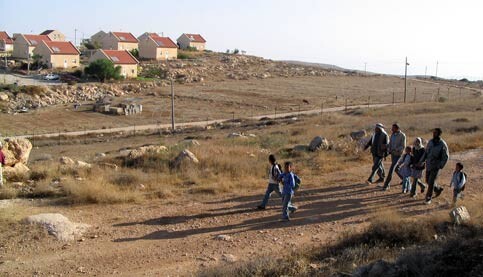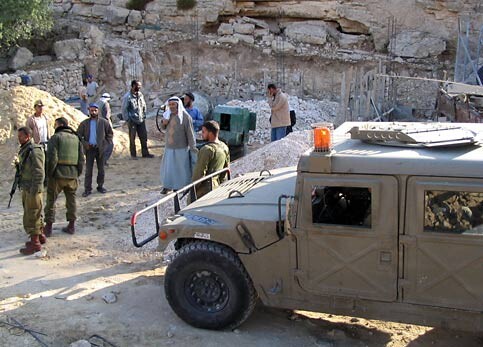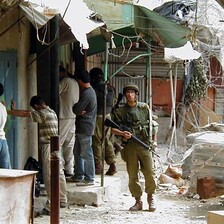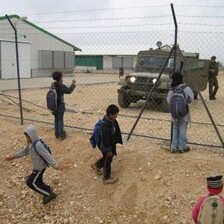Tuwani 4 November 2004

Children from Tuba go to school in Tuwani the “long way” on donkeys in order to avoid the settlement. What should take twenty minutes takes them nearly two hours each way. (Photo: CPT)
31 October 2004
Today we arose at 6am to go watch the children come to school. After repeated stone throwing, shouting, and threats by settlers, the children are taking the long way. They ride donkeys for two hours on the mountains around the settlement and outpost. We station ourselves along their path at strategic places where we can see both the children and the settlement. We would have time to act if settlers come out of the trees, we plan to draw them away from the children, call an Israeli activist friend who can mobilize the army and police, and then attempt to get space between the settlers and the trees so that they are more likely to be caught. This isn’t the best of plans, but every problem has a solution (kul mushkilah ilhaa hal), and this seems to be the best one for now.
It is clear that the Israeli police and military are far more interested in getting us to leave than they are in apprehending the violent settlers. While watching the children go home the other day, two police jeeps (likely the Shin Bet Israeli secret service) drove over to us and videotaped a conversation in which they asked us what we were doing and suggested we try and save the world somewhere else. They also demanded we let them write down and photograph all of our passports. We are confident that they did not do this to the violent settlers living in the outpost in the trees.
To me, all these efforts to get rid of us only prove that we are in the right place. The Palestinians desire our presence and the Israeli soldiers and settlers despise it; this seems to be the natural order of things. As one settler put it, we “disrupt the balance of power.” Since “balance of power” clearly means the Israelis have all the power and the Palestinians have none, we are happy to disrupt it.
I am on my second day of fasting for Ramadan. It’s not too hard until around 2pm; those last three hours are tough. I’d like to say I spend that time of intense hunger and weariness in deep meditation and prayer, but I spend it, like most Palestinians, napping. You can feel electricity begin to build in the village around 4:30pm. We all look forward to hearing the call to prayer come from loud speakers in the nearby town of Karmel at around 5pm. Children in Tuwani relay it to the smaller villagers by hollering “Allahu Akbar” (God is great) and other prayers from the roof tops. My tummy is rumbling as I write this.
Since it’s Sunday, on our way back from watching the children we decided to stop on some rocks in an olive grove to have worship. Bob, CPT’s coordinator of pastoral care, is here, and he’s a Catholic priest. Ugo (a member of the Italian group Operation Dove with whom we work here) is Catholic and I was raised Catholic, so we decided to have mass amongst the trees. We only had a Protestant bible, which is missing the first eight Deuteronimical canon books, originally written in Greek and used by Jesus but dropped by the Jewish Pharisees around 100AD and left out by Martin Luther in the 16th Century. So Ugo read them to us from his Italian bible, and gave us a loose translation. We took turns doing the readings, prayers, and blessings, and then the Eucharist. Bob blessed bread made by Tuwani women and since wine is impossible to get here, we made grape juice from grapes. Bob says grape juice is sanctioned by the Vatican to use for alcoholics, so it must be okay for us. Bob said those who are fasting are allowed to take communion, so I had no problem partaking. It was quite a beautiful service, and it was nice to attend a Catholic mass not out of force or obligation.
Village leaders had a meeting with the Israeli Civil (Military) Administration (CA) and the military, who once again made a series of promises. Iyel, the head of the CA for the southern West Bank was there for the first time. He noted how much attention Tuwani is getting and then asked what the villages want. Saber, Tuwani’s mayor, once again laid out again their needs, from water to roads to the clinic to safe passage for the schoolchildren, and Iyel promised to get them all. He gave them verbal permission to build the clinic and even said he’d come to the party celebrating its opening. The Palestinians asked for this in writing, but Iyel assured them it wasn’t necessary since he’s the head guy. He also demanded the military escort the children on the short path.
Does all this sound familiar? The Palestinians have heard it all before, but they were still encouraged. “This meeting today didn’t just happen” Saber said. “We have had problems and many attacks by settlers for years, but no one outside knew. Thank you for being here, you have brought us attention. Please thank all the people who have helped us, the media, the US consular officials who visited, and the Israeli and international peace groups. Your help made this visit happen.”
We sent out a press release with all the promises, vowing to send out updates about what actually happens.
1 November 2004
Today we tested yesterday’s promises made by the CA. The children took the risky short path, which goes between the settlement and the settlement outpost, and is where the CPTers were attacked the first time. Palestinian men from Tuba were coming to help work on the clinic anyway, so they agreed to accompany the children and asked us to stay nearby to try to watch. Just as Bob and I were heading toward the settlement, an SUV of Australian journalists drove up. “You have perfect timing” I told them, and they got excited by the news I gave them. So they came with us to watch, but decided to drive into the settlement for a better view.
On the short path, it should only take the children twenty minutes, so after thirty we started to get worried. We called Omar, one of the men walking with the children, and he said they were on the short path and there were settlers but no soldiers. We decided this merited intervention so Bob and I cruised up the short path to find them, risk or not. We came upon the Aussie camera crew and they decided the footage was worth the risk of driving right into the forest. We hung back, figuring the cameras might provide the protection the children needed, and we were right. A few minutes later, the group came strolling down the path past the settlement, accompanied by the camera crew, three Palestinian men, an IDF jeep, a settler security jeep, and then us CPTers. “All this for five kids going to school” I thought. I remembered many older Americans’ stories they tell their children about having to walk to school “ten miles in the snow, up hill, both ways”. I imagined these kids telling their children about needing an armed escort from a foreign army and the presence of media and human rights observers from around the world.

Palestinian children from Tuwani walk on the “short path”, between Ma’on Settlement and Ma’on Outpost on their way to school. (Photo: CPT)
As we passed the settlement (the closest I’ve ever been to one) an older settler came out of his house to yell at us. In perfect American English, he hollered, “Go away, you’re not wanted here, you stir up the pot, nobody wants you here!” I guess he either didn’t check with the Palestinians, or he doesn’t consider them people. He refused an interview with the Aussie journalists.
After we got the children safely to school, a group of soldiers arrived and detained us and the Palestinian men. They told us the police were coming, and I asked “Why?” They said that they’re military, and only the police can “deal” with us. They explained that the area we had walked into was a “closed military zone” and that we should be arrested. So we handed off our camera flash cards and video tapes to a CPTer who snuck away, and then waited for the police. Of course with the media there and all the hubbub this case has made, there were no arrests. But we added it to the list of attempts to rid us from this village once and for all.
The soldiers said the children weren’t to use that road again and should go the middle way, on the other side of the outpost, and they’d send a jeep at noon to accompany them. We found good posts on the mountain to watch from, ready to intervene if necessary, and waited. No jeep arrived, but the children took the middle way with two Palestinian men regardless. They came upon a settler farming, who frightened the children. After seeing us and the children, another settler came out with a gun and his 9-year-old son, and the children decided to go ahead and walk the long way home without a donkey. I stayed on the neighboring mountain to watch the settlers and make sure they didn’t try and follow the children or make trouble. The settler kept his gun trained on me and even invited his son to look through the gun’s scope at me. I stayed focused on my mission, and remembered the words of the profit of love, peace, and justice, “Don’t be afraid of those who want to kill you. They can only kill your body; they cannot touch your soul.” (Mathew 11: 28), and I was less afraid. But I still decided to take off my red hat and watch the settlers from behind a large rock. Eventually, I rejoined the rest of the group and we walked back to our house in Tuwani, frustrated but not surprised about the outcome. Once can never anticipate how those kids will get to and from school.
2 November 2004
Today I tied rebar together with wire.
At 6am, we once again watched the children come the long way without event. 11 Palestinian men from Tuwani and the surrounding villages began working on the clinic like Iyel had promised they could. Shortly after they began, an Israeli Army hummer drove up and made them stop while they radioed their commander. Then men patiently waited, and twenty minutes later the soldiers drove off without a word. The men went back to work, only to be interrupted again 15 minutes later. The hummer returned, and this time demanded they stop work completely, and hung around to enforce the order for about a half hour.

IDF soldiers prevent Palestinians from working on their clinic, despite Israeli authorities giving them verbal permission repeatedly. (Photo: CPT)
I was on to lead worship today, and I’d planned a piece on fear since I’d been having some lately. But my anger at the soldiers and the occupation made me change my plans to a piece on enemy love. Check out Luke 6: 27-42 for Jesus’ ideas on not just loving those who are nice to us, and looking at the log in our own eye before trying to remove the speck in our brother’s. We concluded that the soldiers harm themselves with their oppressive behavior, so our opposing them is out of love for them and for the Palestinians who are also harmed. We concluded with the song “Let Justice Roll”, and then headed back down to the clinic site.
The men decided to go ahead and work without permission. They posted lookouts on high ground and started the concrete mixer. They asked us to maintain a presence and deescalate violence should the army return and find them working. Fortunately, they never did, I doubt this group of soldiers really wanted to enforce this ridiculous order. I was not keen to merely watch work being done, so I joined in the best I could. While wiring together pieces of supportive rebar, I explained in my improving Arabic that in the U.S. I do this for my father, who makes retaining walls. I must say I found the work much more fun when it’s forbidden by an occupying army. Most the men quit after a couple of hours, vowing to return that night (after they’d eaten), giving a new meaning to “midnight construction.”

CPTer Joe Carr helps build the clinic. (Photo: CPT)
Meanwhile in Jerusalem, a committee in the Knesset (the Israeli legislature) discussed the issue facing schoolchildren in Tuwani. Mayor Saber gave us a report that evening. He said that he’d testified along with a handful of army generals, police officers, and Israeli activists. The Knesset members ruled the situation unacceptable and demanded it be rectified. They ordered the police to report back in a week with results from their investigations of violent behavior by the settlers; they commanded the military to escort the children to school on the “shortest route possible”; and they set a meeting for three weeks later at which the military must have potential solutions to the overall problem of settler violence. Of course this all sounds great; but the Knesset has little power over the execution of their orders, that is up to the executive branch (Sharon and his cabinet) which is controlled by settlers. So again, we wait and see.
3 November 2004
Nothing is ever the same in Tuwani.
This morning we left bright and early to walk the long way, accompanied by two journalists from Agence France Presse (AFP). Halfway there, we learned that the children were going to test the Knesset’s order and go the short way, but that they’d wait for us so that we could watch. After we arrived in Tuba and the journalists conducted their interviews, the children set off with two men from the village. As they neared the forest, Saber showed up in his Peugot; he’d driven from Tuwani through the settlement. We watched from great distance as the children got in the car and drove towards the woods. Before he’d driven 20 meters, a settler security vehicle cut him off, parking nose to nose with him. In the next few minutes several more settler security vehicles arrived, along with two military jeeps which hung back and let the settlers make the decisions.

Israeli settler security blocks the Mayor of Tuwani’s car from taking the children to school the short way, despite the Israeli High Court of Justice ruling demading they be allowed to. (Photo: CPT)
Eventually, Saber turned the Peugot around, and drove back to Tuba. The settler security refused to let them pass, and the soldiers deferred (as usual) to the settlers. I doubt that Israelis, who are exceedingly proud of their military, would like to see them taking orders from fanatical settlers. Saber pulled over near where we were sitting and sat with us, making calls to journalists, Israeli activists, and Knesset members. Noticing the children’s boredom, I went over and said in Arabic, “OK, today we have school in the car, time for an English lesson.” We spent the next hour or so singing the alphabet and practicing common English phrases, these kids are so smart!
Eventually, two army jeeps came over and out stepped the commander who’d given Saber permission to drive his car in a phone conversation the night before. He yelled at Saber for driving that way and said it was forbidden, completely denying the previous night’s conversation. Saber didn’t call him a liar, he politely crossed his legs, baring the bottom of his foot toward the soldier. Showing the bottom of one’s feet is like giving someone the finger in the Arab world, fortunately the Israeli soldiers hadn’t heard that. They forbid him to drive back that way, and then took off, leaving him and his car stranded in Tuba.
By this time, it was much too late for the children to go to school, they’d have to turn around and come back as soon as they got there. Saber got word that a Knesset member was on his way to Tuba with the police to see what the problem was. The police were sure it was “just a misunderstanding”. Saber decided to go try and meet them in Tuwani, so we set off in the Peugot on a crazy roundabout adventure through the desert. This “road” was clearly intended for donkeys and tractors, maybe a hummer or jeep, but hardly a Peugot. It took us 45 minutes to go what should have been a 3 minute drive, but we made it with the car still in tact. We even picked up a couple hitchhikers on the way, and this was definitely the first time I’ve seen hitchhikers in the friggin’ desert.
Saber got a call from the Knesset member that he’d tried to go to Tuba, but the settlers had destroyed and blocked the only road that leads there. They turned around and went back to Jerusalem without event. Apparently the settlers have more power than the police, the military and the Knesset; so much for “the only democracy in the Middle East”.
I arrived back in Tuwani in time to observe the completion of the day’s work on the clinic, and conduct some interviews before leaving for Al Khalil (Hebron). I’m now back in the city, catching up on email and sleep. I’m heading up to Jerusalem and Ramallah this weekend for some R&R, and then back to Tuwani on Monday.
Joe Carr is a 23-year-old peace activist from Kansas City, Missouri. He has worked Earth First, Food Not Bombs, and Arts in Activism. In 2003, he coordinated for the International Solidarity Movement in Rafah, Palestine, and witnessed Israeli soldiers murder US peace activist Rachel Corrie, and British peace activist Tom Hurndall. He now works with the Christian Peacemaker Teams in Al Khalil (Hebron), Palestine and in the US Palestinian Rights Movement.





